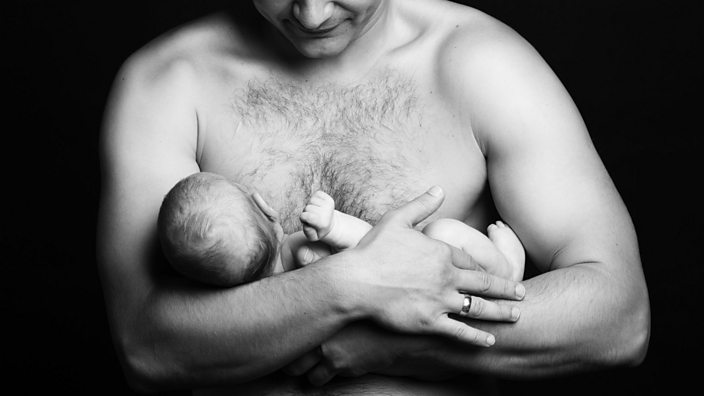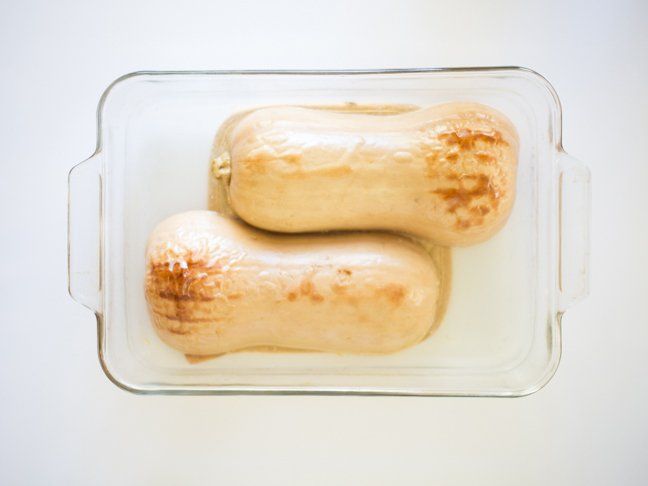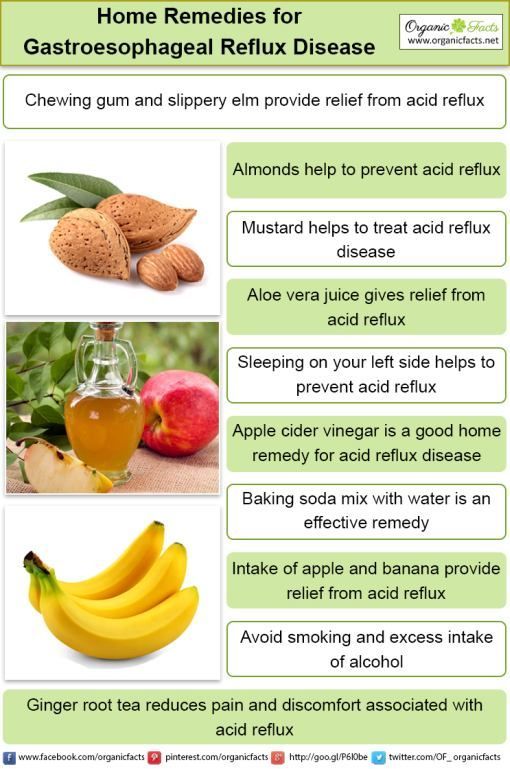Male breast feeding baby
Can men lactate? Whether men can produce milk
The short answer is no, in general men can't lactate or breastfeed. There are some exceptions, though.
Some transgender men and nonbinary people nurse their babies (and use the term chestfeeding or bodyfeeding rather than breastfeeding). If transgender men have chest/top surgery to alter or remove mammary tissue, it may affect their ability to lactate. Trans women, on the other hand, may have a regimen of feminizing hormonal drugs as treatment, which may help with breast tissue development and the potential for breastfeeding.
Chestfeeding can mean nursing at the breast, but it can also mean using a tube attached to the nipple to feed a baby formula or human milk (supplemental feeding). Chestfeeding may also be used for non-nutritive sucking – in other words, for comfort rather than nutrition.
Can men produce milk?
Men don't normally produce milk. In fact, very few male mammals lactate spontaneously.
There are references in literature to men lactating, and a widely circulated story of a Sri Lankan man who breastfed his baby girl after his wife died. Experts question whether these instances did, in fact, exist. Those that did, they suggest, might have been a result of a rare condition, such as a pituitary tumor (the pituitary is a small gland at the base of the brain that produces hormones).
Newborns (male and female) sometimes lactate because of an excess of hormones from their mom's body. And children of both sexes sometimes lactate a bit when they go through puberty – thanks to a rush of hormones. But these conditions are temporary.
Why can't men lactate?
Men do have the anatomy necessary for lactation (nipples, mammary glands, and pituitary glands). What they don't have are the prolactin levels necessary to stimulate the mammary glands to produce milk. Their mammary tissue also doesn't develop at puberty like it does in females.
While men do produce some of the hormone prolactin, women have much higher levels – and those levels surge even further during pregnancy and after delivery, in preparation for breastfeeding.
It's possible for male prolactin levels to surge, too. It might happen because of hypothyroidism, which affects the pituitary gland. There have also been instances of medications – such as the antipsychotic chlorpromazine (Thorazine), steroids, or the heart medication digoxin (Lanoxin) – causing increased prolactin levels in men.
Advertisement | page continues below
Other reasons for a potential spike in prolactin include a pituitary tumor or liver problems, such as cirrhosis of the liver. There have been cases of starvation causing lactation in prisoners of war. One explanation is that liver suppression caused by starvation resulted in a buildup of prolactin (because the liver normally filters hormones from the bloodstream).
Theoretically, it might be possible for a man to be given enough supplemental hormones (injections of estrogen and prolactin, for example) to induce lactation. But there would be many side effects, and it hasn't been well studied.
We don't know if the milk men produce would be similar, nutritionally and in immunity-boosting components, to the breast milk that women produce. One study of a man who produced breast fluid concluded that the concentrations of lactose, proteins, and electrolytes were similar to the colostrum and milk from lactating women.
One study of a man who produced breast fluid concluded that the concentrations of lactose, proteins, and electrolytes were similar to the colostrum and milk from lactating women.
Can men stimulate milk production by pumping?
It doesn't seem like it. So far there have been no successful attempts documented of men producing breast milk by pumping.
Relactation (producing milk again after stopping breastfeeding) and induced lactation (producing milk if you've never breastfed) is possible for women. It takes patience, a commitment to pumping, and sometimes supplementation with formula.
It may be possible for men to pump and receive hormone therapy in order to mimic a woman's post-pregnancy body, but there would likely be significant side effects and there are no studies to support the safety of doing this.
One study reports successful induced lactation by a trans woman who took feminizing hormonal medication – estradiol, progesterone, spironolactone, and domperidone (which is off the market in the U. S.) – in addition to regular nipple stimulation.
S.) – in addition to regular nipple stimulation.
Why do males have nipples?
Both males and females develop similarly in the womb up to a certain point (until about 9 weeks pregnant, when sex differences develop). This includes nipple development. But at puberty – thanks to hormones – females develop breast tissue and an ability to produce milk, while males don't.
It's controversial, but some argue that men's nipples are helpful for men who wish to nurse their babies for comfort. The men in the Aka tribe of central Africa – who share the hunting, camp scouting, and childrearing duties with women in the tribe and are very close to their children – do just that, reports anthropologist Barry Hewlett.
Even without producing milk or nursing, there are ways men and partners can help with breastfeeding. Burping a baby after breastfeeding or giving a baby a bottle of breast milk are just two examples. Read our tips for dads and partners on bonding with your baby for more.
Learn more:
- Breastfeeding tips and tricks
- How your body makes breast milk
- Choosing to formula feed
Was this article helpful?
Yes
No
Men can breastfeed too! — Colorado Surrogacy
Why do men have nipples? Even my 8-year-old son has already asked what the point of his nipples are if men can’t breastfeed. Well, the answer to that is, men actually CAN breastfeed!
There’s anthropological evidence documented of male breastfeeding, especially after the mother fell ill or died. In these documented cases, before there was the option of formula and, in some cases, no access to wet-nurses, the father would hold the baby to his breast and after enough nipple stimulation he would produce milk. The Agence France-Presse reported in 2002 that a 38-year-old Sri Lankafather nursed his two daughters after his wife died during the birth of their second child. Some modern-day doctors argue that this isn’t possible with most men and these documented cases must have been men with pituitary tumors causing them to have a spike in hormones after the baby starts suckling and therefore inducing lactation.
I have a tumor on my pituitary gland that has caused me to lactate since I was 10 years old. Now that I have had children and breastfed for several years, I have seen how drastically a pituitary tumor can affect lactation. I produce enough milk each day to feed 3-4 babies and that’s without hardly trying. It’s crazy what a little benign tumor can do! Lactation has fascinated me ever since I was young! I have even gone so far as to get certified as a lactation educator. The irony is, I never received a drop of breastmilk, I was exclusively formula fed.
Modern day doctors tend to suggest a combo of hormone therapy or medication and nipple stimulation to induce lactation in men and women becoming mothers via surrogacy or adoption…and quite honestly, most doctors will look at you like you are crazy when you ask about inducing lactation in men. When you look at how much breastfeeding education doctors, even pediatricians, receive during medical school in the United States, you’ll find the answer is often 0 hours. I used to volunteer at a breastfeeding support group in Denver once a week. Med students would sit in during the group because they were seeking breastfeeding education that they weren’t receiving in medical school. I asked every single one of them how many hours of breastfeeding education they were required to do in med school, I never got any other answer besides: 0. I hope things have changed since then.
I used to volunteer at a breastfeeding support group in Denver once a week. Med students would sit in during the group because they were seeking breastfeeding education that they weren’t receiving in medical school. I asked every single one of them how many hours of breastfeeding education they were required to do in med school, I never got any other answer besides: 0. I hope things have changed since then.
If you are looking to induce lactation, you’ll have to do some research into which doctors are trained in inducing lactation. I went through 6 pediatricians after my son was born before I found one trained in lactation. This pediatrician was from Europe and had breastfeeding training in medical school there. He was ultimately diagnosed with a tongue tie. Once the tongue tie was revised, all of our breastfeeding issues were solved, and he continued to be exclusively breastfed for another 3 years...but it took 3 months and many doctor visits (the other 5 pediatricians suggested switching to formula). I do not give up easily!
I do not give up easily!
My favorite product to mimic breastfeeding, or help with inducing lactation, and increasing milk supply is the supplemental nursing system. The baby’s suckling will provide nipple stimulation and the pouch and tube will deliver formula or breastmilk to the baby if the mother or father isn’t producing milk or enough milk. This is a way men and women can “breastfeed” without producing milk or while not producing a full supply. It’s a great bonding tool!
There isn’t a lot of breastmilk/breastfeeding research being done. All of the breastfeeding conferences I have attended always joke about how more research is being put into erectile dysfunction than into breastfeeding. That needs to change. I hope to see more research being done in the future and more talk of men inducing lactation!
Visit Our website
LGBTQAshley OldLGBTQ, Lactation, GrowingFamilies, FeedingBabies, Surrogacy, Breastfeeding
0 LikesBreastfeeding is the Father's Responsibility
Walking into a local clinic in Malawi, you will see images encouraging men to play a more active role in the health of their children and mothers. Some of the messages boldly challenge what we consider normal, stating that "exclusive breastfeeding is the responsibility of both wife and husband."
Some of the messages boldly challenge what we consider normal, stating that "exclusive breastfeeding is the responsibility of both wife and husband."
Breast milk contains nutrients that are essential for the growth and development of the baby. In rural areas where women have little money and limited access to clean water for formula, breast milk is a cheap and safe option. But it's also a much better option. The World Health Organization estimates that about 220,000 babies can be saved each year through exclusive breastfeeding. Yet less than half of children under six months of age are exclusively breastfed. nine0003
Since exclusive breastfeeding is often misunderstood, it is important to define what it really means. Exclusive breastfeeding means that the infant receives only breast milk without any other liquids, food, or even water - with the exception of oral rehydration solution or vitamin, mineral, or medication drops/syrups.
So what do men have to do with it?
Breastfeeding is not only time consuming but also requires a lot of physical energy. Stress, fatigue and anxiety can reduce the amount of milk a woman produces. In both rural and urban areas, women are often overburdened with family responsibilities such as cooking and cleaning. Women working outside the home experience additional stress and lack of time, which requires additional support in caring for a child. Research shows that when men receive information about exclusive breastfeeding, they can support women by helping around the house, caring for children, and even providing much-needed ongoing emotional and physical support as a qualified helper or partner. nine0003
Stress, fatigue and anxiety can reduce the amount of milk a woman produces. In both rural and urban areas, women are often overburdened with family responsibilities such as cooking and cleaning. Women working outside the home experience additional stress and lack of time, which requires additional support in caring for a child. Research shows that when men receive information about exclusive breastfeeding, they can support women by helping around the house, caring for children, and even providing much-needed ongoing emotional and physical support as a qualified helper or partner. nine0003
Society, traditions, laws and culture can prevent men from providing such support. Although times are changing and more men are taking on family responsibilities, a cooking dad is still not considered the norm.
How do we try it on?
The University of Pretoria (South Africa), a member institution of the United Nations Academic Impact Initiative (UNAI), conducted a study on men's participation in maternal and child nutrition in rural areas of Central Malawi, which included 44 men and women, as well as 26 informants. Using focus group discussions and in-depth interviews, they found that there are five reasons why men are involved in mother and child nutrition. These include: pride in caring for their families, recognition of the impact of their involvement, advocacy from traditional leaders and NGOs, incentives and barriers, and encouragement from male champions. Men take an active part in cooking, cleaning and looking after children. However, policymakers continue to focus only on women, reinforcing the idea that only women can participate in nutrition. Working with traditional leaders is necessary to overcome cultural beliefs about the different roles played by men and women. When it comes to men, care must be taken so that women do not get hurt. nine0003
Using focus group discussions and in-depth interviews, they found that there are five reasons why men are involved in mother and child nutrition. These include: pride in caring for their families, recognition of the impact of their involvement, advocacy from traditional leaders and NGOs, incentives and barriers, and encouragement from male champions. Men take an active part in cooking, cleaning and looking after children. However, policymakers continue to focus only on women, reinforcing the idea that only women can participate in nutrition. Working with traditional leaders is necessary to overcome cultural beliefs about the different roles played by men and women. When it comes to men, care must be taken so that women do not get hurt. nine0003
Some men may be reluctant to participate in "women's work", but legislation and policy cannot be implemented in isolation. Propaganda using male role models is also needed. Imagine a famous football player or political leader playing an active role in their child's first year. What message will this send to other men across the country?
What message will this send to other men across the country?
Breastfeeding is the shared responsibility of parents. The health and well-being of children can be improved by eliminating gender inequality. Our leaders must support both parents to play an active role in the lives of children. nine0003
Dr. Elizabeth Mkandavir is the Coordinator of the United Nations Academic Impact (UNAI) Goal 2: Zero Hunger at the University of Pretoria. Her research focuses on gender, food security and nutrition policy.
Dr. Nokutula Vilakazi is Program Coordinator at Future Africa, University of Pretoria. Her research focuses on food security and nutrition. nine0028
Can a man produce milk and breastfeed
In short, no. If men could produce milk and breastfeed, women would not miss the chance to delegate part of the feeding of the baby to the man. Men do not lactate, although their anatomy has everything for breastfeeding. We explain why this happens and what are the exceptions.
Irina Obraztsova
Legion-Media
The man has a nipple and mammary glands. What prevents him from breastfeeding and is it possible to induce lactation in him? Here's what the scientists say0003
Contents of the article
Can a man produce milk
Most men are unable to produce breast milk. In general, male mammals in extremely rare cases spontaneously lactate.
There are references in the literature to men breastfeeding, such as the widespread story of a Sri Lankan who breastfed his daughter after the death of his wife. Experts doubt the reality of this story. They suggest that isolated cases of male feeding may be the result of a rare health problem, such as a tumor of the pituitary gland (a small gland at the base of the brain that produces hormones). nine0003
Newborns (boys and girls) sometimes have drops of milk on swollen nipples due to excess mother's hormones after birth (girls still have newborn periods). After all the mother's hormones leave the child's body and the work of their own hormonal system is established, these phenomena stop. Also, children of both sexes sometimes lactate a little during puberty due to the rush of hormones. But this is a short-term temporary condition, which is not observed in adults. nine0003
After all the mother's hormones leave the child's body and the work of their own hormonal system is established, these phenomena stop. Also, children of both sexes sometimes lactate a little during puberty due to the rush of hormones. But this is a short-term temporary condition, which is not observed in adults. nine0003
Why can't men breastfeed?
Oddly enough, the male anatomy has all the conditions for breastfeeding: the mammary glands, nipples and the pituitary gland responsible for the production of prolactin, the hormone of lactation. However, the male endocrine gland does not produce enough prolactin to stimulate the mammary glands to produce milk. And during puberty, boys do not grow breasts and develop "milk" tissues, as girls do. nine0003
The small amount of prolactin that the male pituitary gland normally produces is involved in the production of testosterone, affects the formation of spermatozoa and is responsible for regulating reproductive functions. In women, the level of prolactin is much higher, during pregnancy it increases even more and reaches a peak after childbirth at the beginning of breastfeeding.
In women, the level of prolactin is much higher, during pregnancy it increases even more and reaches a peak after childbirth at the beginning of breastfeeding.
What increases prolactin production in men?
One of the common causes of a sharp increase in the hormone prolactin in men is hypothyroidism. This disease affects the pituitary gland and can trigger a hormonal surge. Also, certain medications can stimulate the production of the lactation hormone in men: the antipsychotic chlorpromazine (Thorazine), steroids or the heart drug digoxin (Lanoxin), as well as large doses of the anti-ulcer ranitidine and anti-nausea drugs containing domperidone, such as Motilium. It is sometimes used by women with feeding problems to increase milk production. nine0003
Other possible causes of a prolactin surge include a pituitary tumor and liver problems such as cirrhosis. In history, cases of lactation of starving prisoners of war are known. The explanation is this: the suppression of liver function caused by starvation led to the accumulation of prolactin (since the liver normally filters hormones from the bloodstream).
The explanation is this: the suppression of liver function caused by starvation led to the accumulation of prolactin (since the liver normally filters hormones from the bloodstream).
It is theoretically possible to induce lactation in a man with large doses of hormones, for example, with the help of injections of estrogen and prolactin. However, it will certainly cause a lot of side effects. This type of hormonal therapy is not performed and has not been studied. nine0003
We do not know if the milk produced by men will be similar in nutritional value and composition to human breast milk, or if it will contain components to strengthen the immune system and help in the digestion of babies. However, anecdotal studies in this area exist: scientists studying the breast fluid of one man concluded that the concentrations of lactose, proteins and electrolytes in it were similar to colostrum and milk of lactating women.
Can men stimulate milk production by pumping? nine0048
No successful attempts to stimulate male lactation by pumping have been found. Women, on the other hand, are capable of relactation (restoration of milk production after the completion of feeding) and induced lactation, that is, the production of milk by a breast that has never breastfed. There are many cases when, for example, a grandmother or a foster mother fed a baby with her breast. These processes are quite laborious, require patience, constant pumping and sometimes supplementation with formula or donor milk, but they are quite possible. nine0003
Women, on the other hand, are capable of relactation (restoration of milk production after the completion of feeding) and induced lactation, that is, the production of milk by a breast that has never breastfed. There are many cases when, for example, a grandmother or a foster mother fed a baby with her breast. These processes are quite laborious, require patience, constant pumping and sometimes supplementation with formula or donor milk, but they are quite possible. nine0003
To bring the body into the state of a woman who has just given birth, a man will need to both pump many times a day and receive hormone therapy. Such experiments are fraught with side effects and there are no studies confirming the safety of such interventions.
One study reports successful induced lactation in a trans woman who was taking feminizing hormone drugs—estradiol, progesterone, spironolactone, and domperidone (which is not sold in the US)—in addition to regular nipple stimulation.











